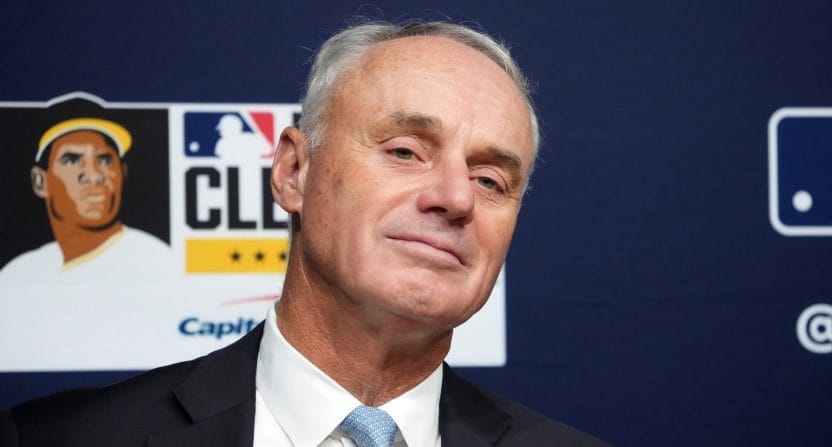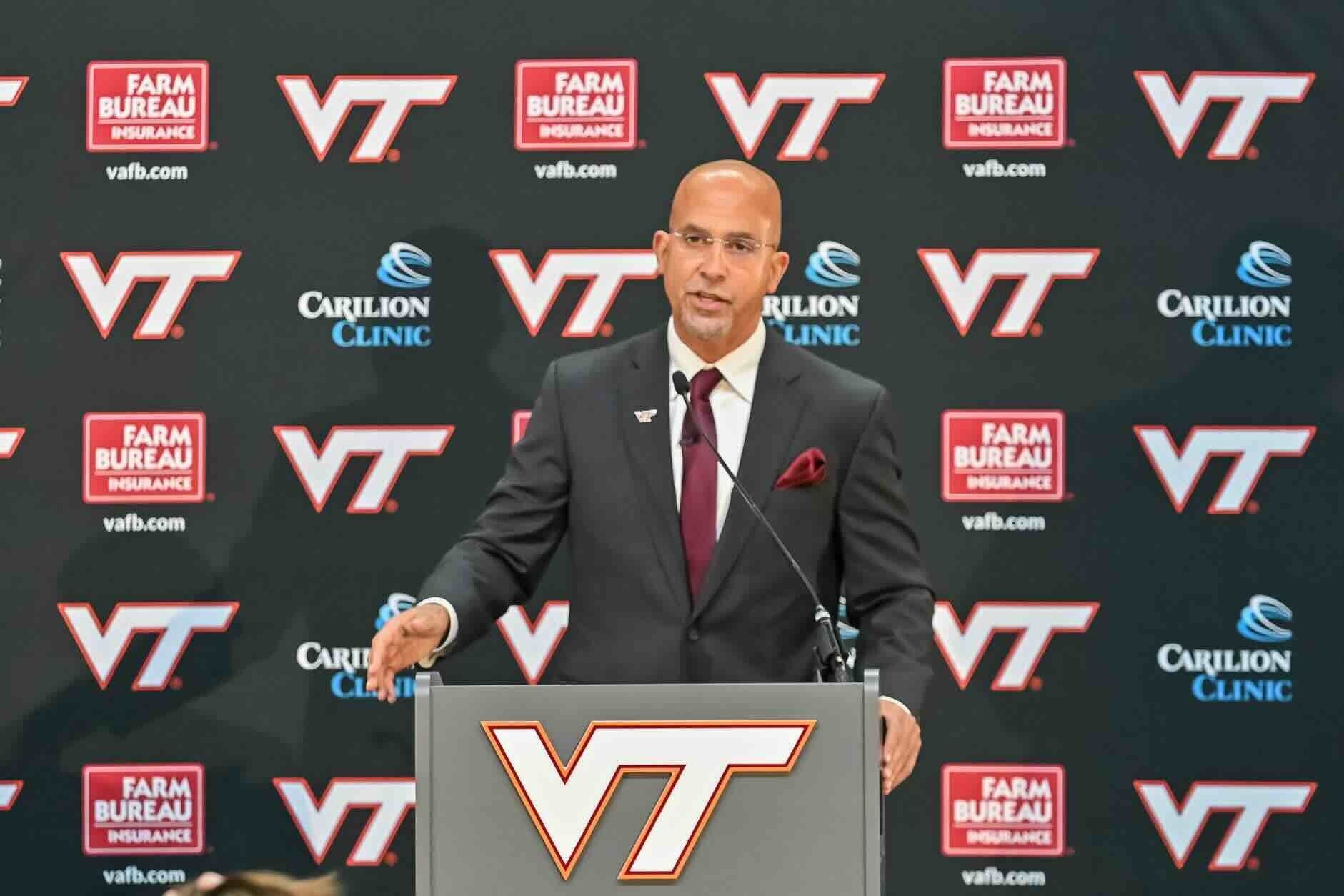Welcome to The A Block, Awful Announcing’s daily newsletter, where you’ll always find the latest sports media news, commentary, and analysis.
Did someone share this newsletter with you? Sign up for free to make sure you never miss it.
🎤 QUICK START ✍️

Credit: Liam McGuire
🏒 No Blue Jackets required. It’s gonna be a while before Bill Simmons is welcomed back to Columbus, Ohio. In the latest episode of his podcast, The Ringer boss proclaimed the city’s NHL franchise, the Blue Jackets, as the “most irrelevant franchise in professional sports.” We’re sure their fans will handle that with grace and acceptance.
⚾ Major League deals. MLB announced its new three-year media rights agreements with Netflix, NBCUniversal, and ESPN on Wednesday. As part of the announcement, we learned that, amongst other things, MLB.tv will be available on both the ESPN app and MLB platforms. NBC will receive a comprehensive package that includes Sunday Night Baseball, the entire Wild Card round, and exclusive Opening Day and Labor Day primetime games.
⛹️ Load mismanagement. If you feel like NBA star players have missed more games than usual this season, you’re not mistaken. According to Yahoo’s Tom Haberstroh, NBA stars — defined by the league’s participation policy as any player who has made an All-Star or All-NBA team in any of the past three seasons — have already missed more than 200 games due to injury or illness through the first four weeks of the 2025-26 campaign.
🗣️ Hudson hark. It was hardly a surprise to see Apple Podcasts recognize Pablo Torre Finds Out as both one of its best overall podcasts and singular episodes in its 2025 review. One of its most prominent critics — and subjects — spoke up to take credit. Sharing the official podcast account’s post announcing the news, Jordon Hudson wrote, “You’re welcome.” Well played.
🎙️ Monday Night Fitzball. According to a report by Richard Deitsch of The Athletic, Fitzpatrick will call the Monday Night Football game between the San Francisco 49ers and Carolina Panthers for Westwood One radio. He’ll team up with play-by-play announcer Ryan Radtke. The usual broadcast duo of Kevin Harlan and Kurt Warner has the week off.
The Briefing Leaders Rely On.
In a landscape flooded with hype and surface-level reporting, The Daily Upside delivers what business leaders actually need: clear, concise, and actionable intelligence on markets, strategy, and business innovation.
Founded by former bankers and veteran business journalists, it's built for decision-makers — not spectators. From macroeconomic shifts to sector-specific trends, The Daily Upside helps executives stay ahead of what’s shaping their industries.
That’s why over 1 million readers, including C-suite executives and senior decision-makers, start their day with it.
No noise. No jargon. Just business insight that drives results.
️🚨 LEADING OFF 🚨
Major League Baseball saved face, but at what cost?

Credit: Kirby Lee-Imagn Images
Just nine months ago, Major League Baseball found itself in a situation that looked borderline dire.
ESPN had just opted out of its Sunday Night Baseball package, meaning MLB was out more than half a billion dollars annually, and no one was knocking down the door to scoop up what ESPN had left on the table.
It turns out, ESPN was justified in its decision. Its old package — which included Sunday Night Baseball, the entire Wild Card round, Opening Night, and the Home Run Derby — was sold for less than half of the annual fee it had initially been paying, according to various reports about MLB’s new set of short-term media rights deals announced on Wednesday.
NBC and Netflix, the two companies taking over ESPN’s old package, will pay a combined $250 million: a maximum of $200 million from NBC (whose fee will fluctuate based on viewership) and $50 million from Netflix. NBC secured Sunday Night Baseball, the Wild Card games, and a Sunday morning package for Peacock that previously aired on Roku. Netflix will take Opening Night and the Home Run Derby, along with some other special event games on the calendar.
Ironically, the price MLB is getting for what is essentially the old Sunday Night Baseball package is similar to what ESPN had offered the league before opting out of its agreement in February. Some will recall that during that time, reports emerged that ESPN told MLB it’d hold onto its deal if the league were willing to lower its annual fee from an average of $550 million to around $200 million.
At the time, the league found the offer laughably low. Commissioner Rob Manfred went on to call ESPN a “shrinking platform” after they opted out, and assured owners that the league’s inventory would command even more money on the open market than ESPN had previously paid. Surely, Manfred quickly realized it was his comments that were, in fact, laugh-out-loud funny.
Not only is MLB getting less than half of its original rights fee for the old ESPN package, but the league actually had to give NBC and Netflix additional inventory on top of the old package to do so. And that, in a nutshell, was the theme of all three deals MLB announced on Wednesday, including a brand new agreement with ESPN.
Yes, ESPN will continue its relationship with MLB after all. But the Worldwide Leader’s place in the sport will look much different. Instead of focusing on national rights, ESPN went local, acquiring MLB’s out-of-market package, MLB.tv, for use within its new direct-to-consumer app. ESPN also secured the in-market rights for six MLB clubs whose local broadcasts are currently produced and distributed by the league, and will gain in-market rights for any future clubs that decide to ditch their current broadcast agreements in favor of MLB distribution. A 30-game package of weekday regular-season games is the only slice of national inventory left on ESPN’s airwaves.
Interestingly enough, ESPN will pay MLB the same amount under its newfangled, local-focused deal as it was scheduled to pay under the terms of its old Sunday Night Baseball contract—$ 550 million per year.
So Manfred was technically correct. MLB will end up with more media rights revenue in 2026 than it did in 2025. But the league had to part ways with one of its most valuable assets to do so.
According to a report by Andrew Marchand in The Athletic, MLB.tv generated “hundreds of millions” of dollars for the league. Now, whenever someone decides to pay $150 for a subscription to the out-of-market package, that money goes directly into ESPN’s pocket.
One could see this as a cash advance of sorts. Instead of riding the wave of subscriber growth, which can fluctuate year to year, MLB is charging a flat fee for the service and mitigating some downside risk. But the league’s decision complicates its long-term plans.
Manfred has made clear the league intends to nationalize its local rights strategy come 2028, when the league’s major media rights deals with Fox and TNT Sports — both of whom hold the vast majority of postseason inventory — expire, along with the trio of short-term agreements announced on Wednesday. That’s when the chickens may come home to roost.
Click to read the rest of Drew’s explainer on why MLB’s new deals should serve as a warning for the league.
📣 THE PLAY-BY-PLAY 🎙️
On the latest episode of The Play-By-Play, Awful Announcing’s Brendon Kleen and Drew Lerner break down the updated media rights deal between MLS and Apple.
📣 NOTABLE QUOTABLES 🗣️

Credit: Liam McGuire
“I’ve been to Oxford a million times, and I think it’s terribly unfair to bring up echoes of yesteryear, the 60s, and try to portray Oxford as that type of place today. It’s not. The South has changed. You can make your own interpretation, but to dump on Oxford while saying Gainesville and Baton Rouge would be utopia was just baffling to me.” - Paul Finebaum reacting to Stephen A. Smith saying ‘the brothers do not want to go to Oxford, Mississippi’ as a reason Lane Kiffin should leave.
“It would improve the product, it would improve the health of the players, but nobody gives a damn, because they want to continue making the same amount of money.” - Michael Wilbon on why NBA owners and players won’t shorten the schedule to cut down on injuries.
“Why you gotta play guys 35 minutes? Why you gotta play eight guys? Why can’t you play 10 to 11? I’m talking about mandate it.” - Stephen A. Smith, who suggested a mandated 33-minute cap for NBA players to solve the injury issue.
“What an amazing gift that Gary on his time off — and he takes so little time off — he watches every single second of every out, and then he calls me up and he’s like, ‘Alright, you want some feedback?'” - Steve Gelbs, on how Mets announcer Gary Cohen helped him get over his fear of play-by-play.
“He breaks off that long touchdown. Around here in these parts, partner, we protect this house. We paid a lot of money for this house. Get out of my tunnel, boy. Get back on the field. So he gave him a little something. Let him know what’s up.” - Johnny Manziel offering a defense of the Texas trooper who confronted South Carolina players following a touchdown.
“I would say, respectfully, to the people who are saying ‘They shouldn’t go for it, it wasn’t working out, take the points, whatever,’ shut up, as respectfully as I can say it. Shut up.” - Kay Adams’ message to detractors of the Detroit Lions’ aggressive fourth-down strategy.
🔥 THE CLOSER 🔥
“We’re going to be aggressive.”

Credit: Brian Bishop-Imagn Images
This is the time of year when we hear all of the usual cliches from college football coaches being considered or rumored for new jobs. Everything from “I love it here,” to “I’m focused on the here and now,” to “Why would I leave? This is a destination job,” to “I’m not gonna comment about hypotheticals.”
All of these are all the more comical when the person who utters them ends up leaving for more money and shinier facilities a few weeks later.
Far less appreciated, but no less enjoyable, are the cliches that coaches employ when they arrive at their new job.
James Franklin, previously of Penn State, was introduced as the new head coach of the Virginia Tech Hokies on Wednesday. Talking about what kind of culture he was going to install there, he broke out the mother of all newly hired head coach cliches:
We’re not mad at him, mind you. It’s a perfect quote for the situation. It’s exciting to fans, impenetrable to critics, and essentially meaningless when analyzed.
It’s also what just about every new head coach says on their first day.
“We're going to be aggressive and tough.” - Former Arkansas HC Sam Pittman.
“We're going to be aggressive in everything that we do.” - Former Maryland HC DJ Durkin.
“We’re going to be aggressive on offense…” - Kentucky MBB HC Mark Pope.
“We’re going to be aggressive…” - NC State MBB HC Will Wade.
“We're gonna be disciplined and we're going to be aggressive.” - Iowa OC Tim Lester.
“We're going to be aggressive. We're going to challenge everything.” - Chicago Bears DC Dennis Allen.
“On defense, we’re going to be aggressive…” - BYU HC Kalani Sitake.
“As far as changing things, we’re going to be aggressive…” - San Francisco 49ers DC Nick Sorensen.
“We’re going to be aggressive.” - Oregon State HC Trent Bray.
Honestly, we could do this all day. But you get the point. We’re excited to see James Franklin’s aggressive Virginia Tech attack, just as we’ve been for every aggressive football and basketball program that has existed before it.
Thank you for reading The A Block! Sign up for free to make sure you never miss it.


